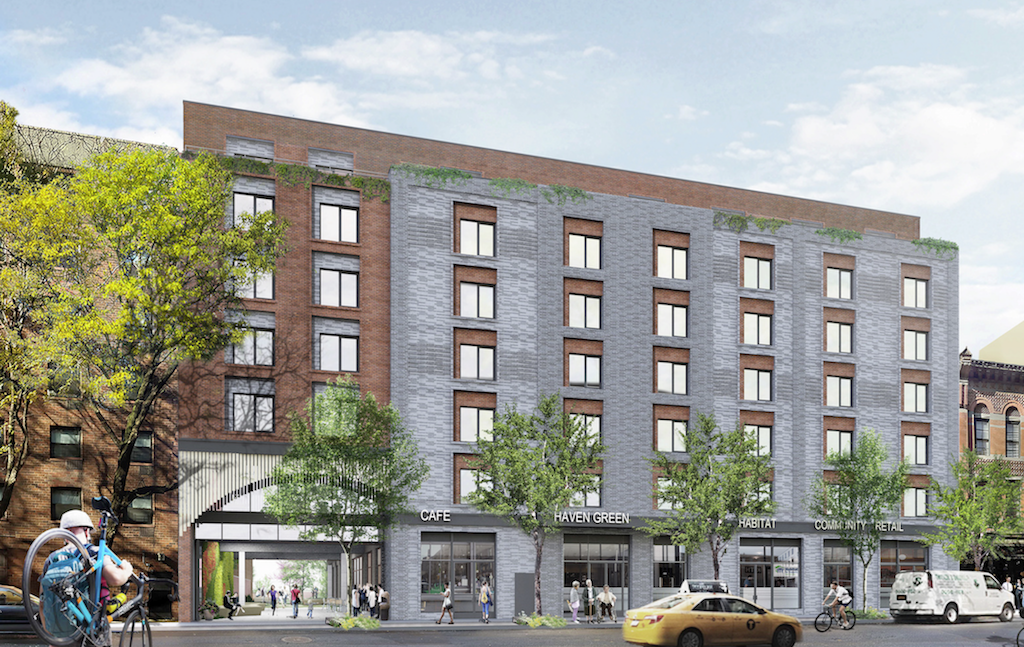
BY LINCOLN ANDERSON | As expected, the de Blasio administration cagily waited until after the election to announce the winning development plan for the Elizabeth St. Garden.
The contentious garden issue was nearly the undoing of two-term Councilmember Margaret Chin, who barely hung on to win the Sept. 12 Democratic primary by 222 votes versus young upstart Christopher Marte.
Last week, the Daily News first reported that the winner of the request for proposals, or R.F.P., for the Elizabeth St. project was a group including Pennrose Properties, Habitat for Humanity NYC and RiseBoro, a nonprofit formerly known as the Ridgewood Bushwick Senior Citizens Council.
It had raised eyebrows that also in the running for the job was Asian Americans for Equality, an organization co-founded and formerly led by Chin, the housing project’s main sponsor.
The garden sports two community groups — the one that currently operates it, and another that got bumped from running it but still remains active in advocating for its preservation. One group is preparing to file suit against the city while the other is considering suing.
“Right now, we are getting ready to file and fight,” said Joseph Reiver, executive director of Elizabeth Street Garden, Inc., which has operated the garden since this past spring.
Meanwhile, Friends of Elizabeth Street Garden, which ran the space for the previous several years, is not ruling out a lawsuit, yet it wasn’t clear if they would seek to join onto a suit by E.S.G. or file one separately.
“We never said we weren’t going to sue,” Jeannine Kiely, the group’s founder, said. “We said we’re going to keep working.”
Although the two garden groups have feuded in the past, they are in agreement that the most important thing now is to save the garden.
Dubbed Haven Green, the project announced Thursday would include 121 apartments for seniors, plus 7,600 square feet of open space.
(The project’s R.F.P. originally mandated preserving only 5,000 square feet of the 20,000-square-foot lot as open space.)
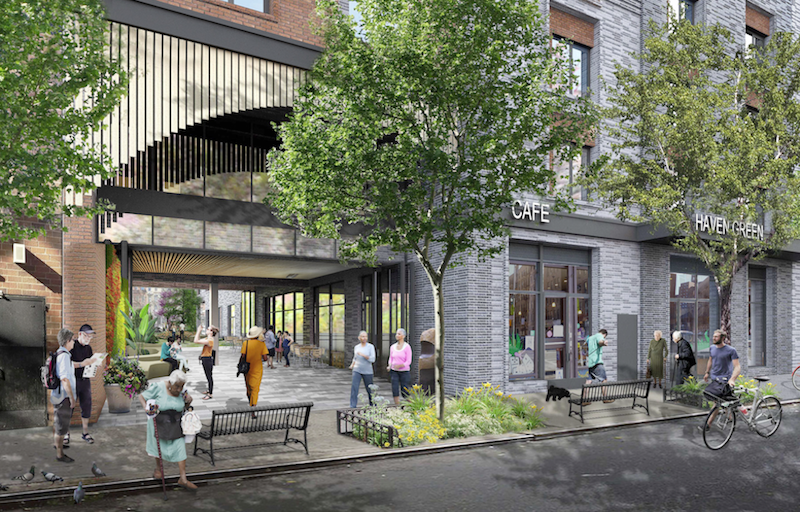
A plan description on the Department of Housing Preservation and Development’s Web site describes the residential units as “deeply affordable and energy-efficient senior apartments…for affordable to extremely low, very low- and low-income seniors.”
According to the News, the apartments would be permanently affordable and open to seniors earning incomes between $20,040 and $40,080 a year. Rents would range from about $331 to $761 per month, on an income-based sliding scale.
Thirty-seven of the units would be slated for formerly homeless seniors.
The building would also serve as Habitat NYC’s new headquarters. In addition, the plan calls for SAGE, an organization serving the senior L.G.B.T. community, to have an office on the building’s main floor, where a SAGE representative would provide care.
As for what would remain of the garden, according to the H.P.D. Web site, it would be “high-quality publicly accessible open space.”
“The public space design seeks to recreate many of the existing features and layout of the site,” the description notes, “including passive spaces, sculptures and art pieces, lawns, diverse plantings, space for gardening and open seating. The new space will maintain flexibility and be further developed by the community through an upcoming participatory design process.”
Habitat NYC would maintain the garden.
The lot’s Mott St. side would remain open space, while there would be a passageway through the building from Elizabeth St. connecting to the open space.
Chin was reported saying she hoped the plan’s opponents would change their view — and help design the new park area.
“We invite them to come in and work with us to create this beautiful space that everyone in our community, the whole entire community, will be able to share,” she said.
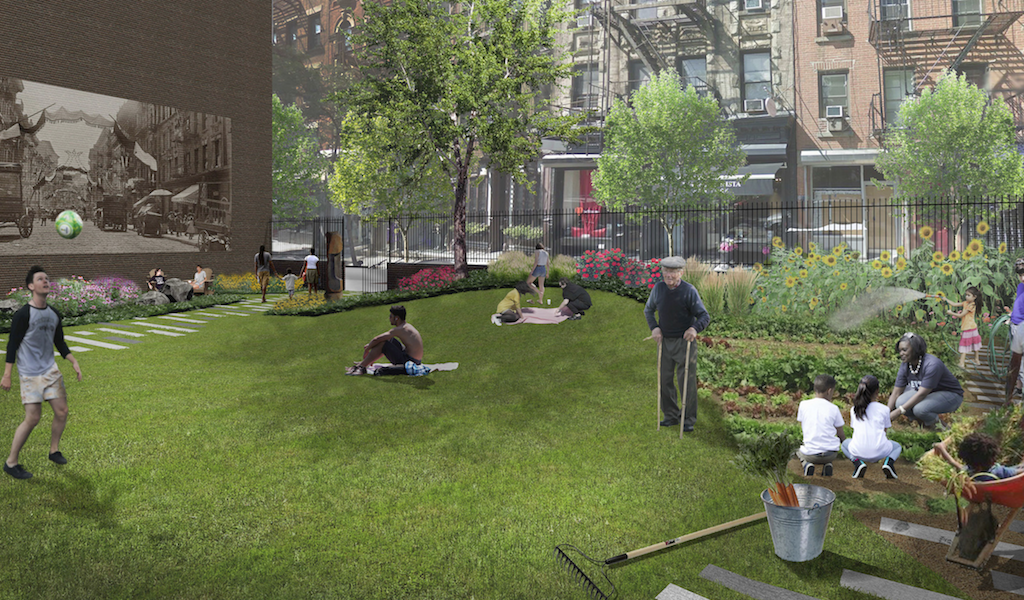
However, the opposition isn’t bending and, in fact, has just picked up another politician — Congressmember Nydia Velazquez — who signed onto a joint statement, released last Friday, with other local elected officials against the plan.
Other signers, in addition to Velazquez, included new state Senator Brian Kavanagh (who was sworn into office Dec. 6), Congressmember Jerrold Nadler, City Comptroller Scott Stringer, Public Advocate Letitia James, state Senator Brad Hoylman, and Assemblymembers Yuh-Line Niou and Deborah Glick, along with Terri Cude, chairperson of Community Board 2.
“The city’s decision to build housing at Elizabeth St. Garden is both unfortunate and a great disappointment,” the politicians and Cude wrote. “We oppose this development proposal. Lower Manhattan needs both more affordable housing and more open space, and we reject as false the idea that we must choose between these two vital community needs.
“There’s no doubt we must address our city’s affordability crisis,” the pols said. “But affordability cannot come at the expense of the precious open spaces in our communities. We can — and must — both build affordable housing and preserve our green spaces.”
Two years ago, Tobi Bergman, then-chairperson of C.B. 2, identified — and the full board of C.B. 2 subsequently approved his idea — an alternative site for the affordable housing, a vacant lot at Hudson and Clarkson Sts., where the city had drilled a shaft down to the new City Water Tunnel No. 3. Bergman stressed that up to five times more housing units could be constructed at this site versus at Elizabeth St. However, Mayor Bill de Blasio and Chin have refused to shift the housing project to the alternative site — and only gallingly responded by saying the Hudson St. site could be used to build even more affordable housing.
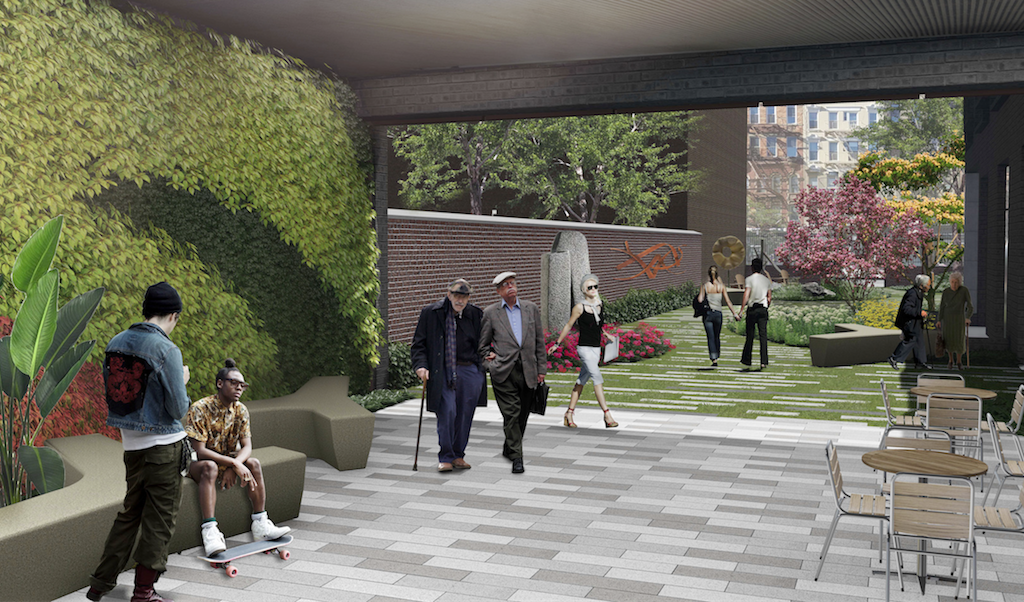
Friends of Elizabeth Street Garden hastily scheduled a press conference on Mon., Dec. 11, on the City Hall steps to protest the administration’s continued push to develop the Little Italy / Soho site in the face of overwhelming community and political opposition. Joseph Reiver of E.S.G. and his group were there, too, along with Stringer, James — both of them potential mayoral candidates in 2020 — Kavanagh and Niou.
The next day, Chin held a rally at City Hall with members of SAGE and senior-housing advocates, saying why the housing project is needed.
This past April, Reiver’s E.S.G. took over control of the garden’s operation from F.E.S.G. and announced it intended to sue the city to block the housing plan. At that point, the leaders of F.E.S.G. had been hesitant to commit to joining the lawsuit as its lead plaintiff, prompting the split.
Joseph Reiver, the leader of the new garden group, is the son of Allan Reiver, who originally developed the garden — with the community’s approval — in 1991 on the site of a former trash-strewn lot. Allan Reiver laid down real grass and filled the space with statues and architectural pieces, creating a truly unique setting. He has been leasing the lot from the city for $4,000 a month ever since.
“This fight is not over,” Joseph Reiver said after the city announced the developer. “We will continue to pursue all options, including Elizabeth Street Garden’s legal action. We urge the public not to be deceived by the fancy developer renderings and to see the truth of the matter; that the administration, the mayor and Councilmember Margaret Chin have continuously ignored our community’s outcry.
“They have ignored the thousands of letters and signatures in support of protecting and preserving the garden in its entirety,” he said. “They have ignored C.B. 2’s four resolutions, and they have ignored a true win-win outcome — where they could build more affordable housing on the alternative sites provided by our community.
“No matter how the city sugarcoats their plans, they are yet again taking away a public community treasure,” Reiver said. “From the beginning, the city’s process of designating the garden as a site for affordable housing was not transparent.”
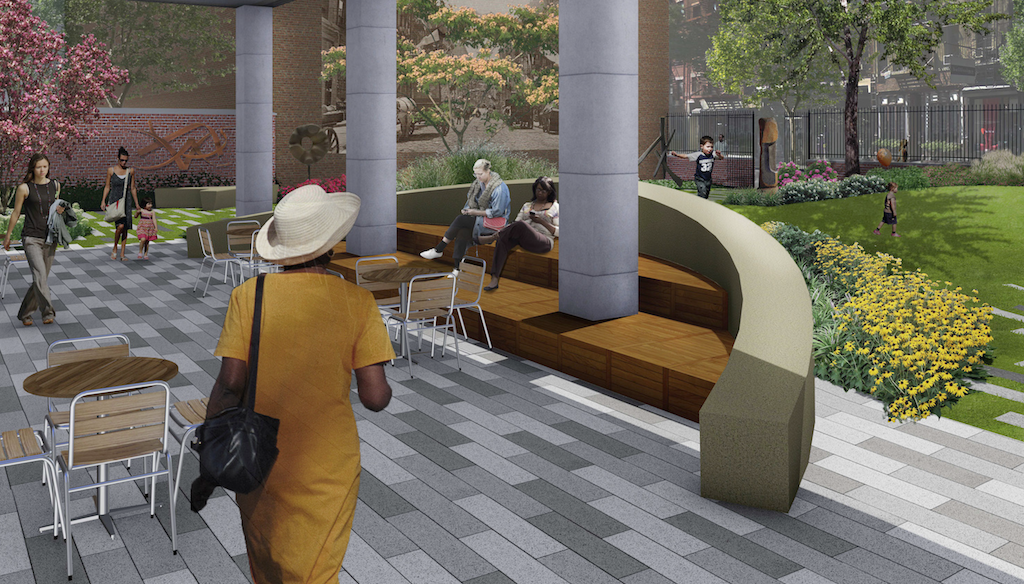
Friends of Elizabeth Street Garden also issued a statement about the news, saying, “Friends is actively consulting with attorneys and has developed a very strong legal strategy, but we cannot comment further at this time. This important piece of city-owned land has been exclusively in public use for almost two centuries.
“In 1981, the city promised the garden site entirely for recreational use when it sold 68 percent of the former school site for affordable housing at 21 Spring St. Instead of destroying a beautiful and heavily used open space, the city should allocate its scarce housing resources to ensuring that these 152 units of Section 8 housing at 21 Spring St. remain affordable when the current program expires in 2023.”
F.E.S.G. was referring to the Little Italy Restoration Apartments, or LIRA, affordable-housing complex, which was built on the spot of a former public school. The current garden space was the school’s playground and basketball courts. The 1981 “promise” she referred to was a formal land-disposition agreement with the city.
Kiely, the F.E.S.G. founder, slammed the design renderings that the city is releasing, saying they create the illusion of more open space than the project would really have.
“The perspectives are deceptive and misleading,” she said. “The depth of field has been deceptively manipulated.”
F.E.S.G. also released a shadow study showing how the natural sunlight that currently floods the garden would be blocked by the new housing. This would result, the Friends said, in “a small and heavily shaded privately owned public space on Mott St.”
Marte, the former City Council candidate, also issued a strong statement in solidarity with the garden’s supporters.
“The Elizabeth St. Garden serves a community as diverse as its wildlife, and just like the now-endangered flowers and trees, our roots are firm,” he said.
“We have been belittled and told that our coalition of children who want to play outside, and seniors that want to chat in the shade of a tree, is not strong enough. But we saw a referendum when over 65 percent of the neighborhood voted in last month’s election for an opportunity to save our open space.”
Marte was referring to the general election for City Council District 1, in which Chin — even after being entrenched in office for eight years — did not win even a simple majority of the vote.
“Our solution is clear and nondivisive,” he stated. “Blocks away from the garden is an empty gravel lot. It serves no one, and houses nothing but the trash piled by its gate. Blocks away from a health center,” he noted, referring to the VillageCare senior rehab faculty on W. Houston St., “and an affordable grocery store, and capable of hosting up to five times as many units, this is the home we need for our seniors.
“Almost every other park within walking distance has been reduced to concrete,” Marte added. “We as a community have flocked to this garden and tended to its life. We will preserve it for generations to come.”
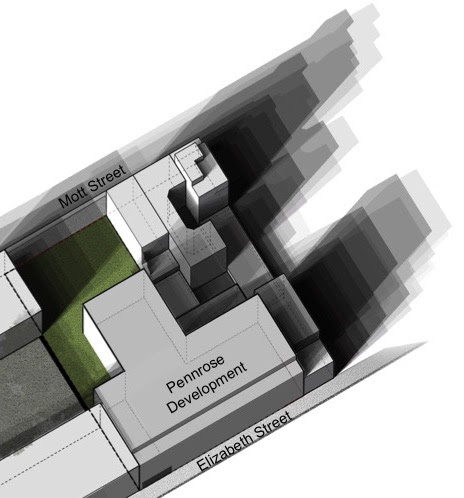
E.S.G. and F.E.S.G. have somewhat different visions of how the garden should operate in the future, should it be saved. Joseph Reiver said, ideally, his group would like to see the garden owned by a nonprofit under the oversight of a community land trust. Under the E.S.G. vision, two events for $10,000 per month would be held there, such as weddings, to raise money for the garden’s ongoing maintenance, with 100 percent of the proceeds going to the garden, he said.
F.E.S.G., on the other hand, preferably, would like the property to become mapped as permanent parkland.
Reiver explained that if the space were to become city parkland, they would not be able to keep all of its sculptures, which is what makes the space “magical.”
However, Kiely said her group would also be open to the option of having the space preserved under a community land trust.
A third scenario, Reiver said, is for it to become a Greenthumb garden space. But Kiely noted that not all Greenthumb spaces are permanent parkland, such as is the case with the LaGuardia Corner Gardens at Bleecker St.
Both Reiver and Kiely stressed, however, that the main thing right now is saving the garden, and that the mechanism of how the place might be operated down the road would be hashed out later.
In 2012, the Elizabeth St. lot was quietly earmarked for affordable housing by Chin and former Mayor Mike Bloomberg as a stealth add-on to the Seward Park Urban Renewal project on the Lower East Side — even though the two sites are in different community boards and there had been no public review of the plan for Elizabeth St. C.B. 2 was only notified after the fact.
Local residents soon realized the now-threatened statue-filled lot — which Allan Reiver most often left closed to the public due to liability issues since he had no one to staff it — was, in fact, city-owned property. They created the Friends of Elizabeth Street Garden both to program the space and fight for its preservation as permanent parkland.
With Allan Reiver’s cooperation, the Friends opened the garden up to public use, and it has become a vital resource that the community has been doggedly fighting to save ever since, with the support of nearly every local politician — except, that is, for Chin and de Blasio.































